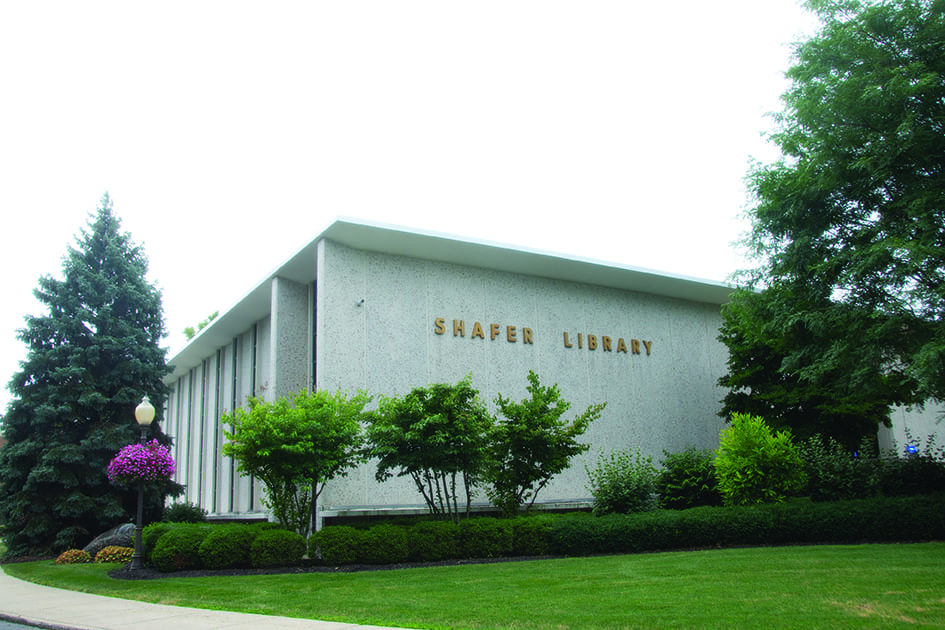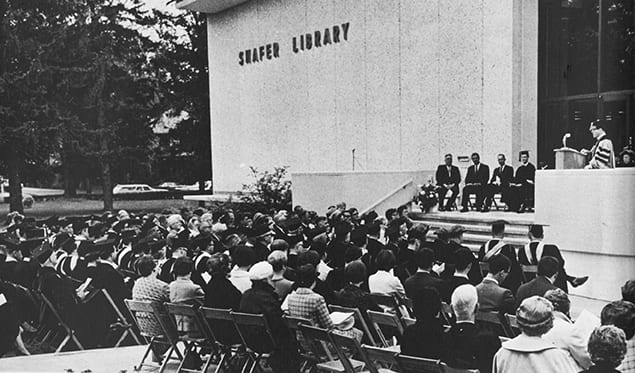Shafer Library’s 50th Anniversary Celebration is Cause for Contemplation

Shafer Library’s story has been shared within the line of volunteers who transported books from their previous home in Old Main, within its stacks featuring tomes about subjects ranging from women’s suffrage to organic chemistry, and between workers who make it possible for others to shape narratives and convey knowledge.
And yet, as digital communication increases, many of us now tend to take the library for granted. After all, there is not as frequent of a physiological connection forged between person and paper as there used to be when, say, the library’s card catalog in multiple narrow drawers and books arranged by the Dewey Decimal System were the only ways to find sources. Contrasted with today, scholarly information can be accessed with a phone from any location in the world via Shafer’s website. Books and articles are electronically read, or books not in Shafer’s stacks are borrowed from other institutions in the state and delivered to campus in three days or less.
Then what, you may wonder, does the present and future look like for Shafer Library?
According to University Librarian Andrew Whitis, the library may be more important to us now than it has ever been.

Here’s why:
First, as digital theory scholars will attest, accessibility is a key component to meaning making. For the UF community involved in studies, research and general knowledge acquisition, Shafer provides the information-finding means, both online and in person. Need to find out about the prevalence of mental disorders among those within the juvenile justice system? Want to better understand the affect that Alex Jones’ Sandy Hook conspiracy theories have on the families of the deceased? Shafer Library will help you find what you need in those regards.
Second, (speaking of conspiracy theories), Whitis added that another essential duty of librarians is to help people separate fact from fiction, to effectively evaluate sources, and to critically consider the information they’re receiving. Shafer Library staffers can help you determine how to “validate if information is correct or incorrect,” and how to understand the difference between fact and truth. Digital dissemination has served to improve open access to information, which has also provided a much larger portal for opinions that pose as facts.
Within UF’s “Principles of Speech” introductory course, the library orientation curriculum is changing to focus more on source evaluating, Whitis said.
And, of course, Shafer Library still has operational costs, which people also tend to forget about. “Access to information has changed a lot, but it’s never free,” Whitis pointed out.
From a tangible standpoint, Whitis maintains Shafer Library will always occupy physical space, regardless of digital discourse proliferation. It will house infrastructure to support digital access, and workers to manage and provide information; it isn’t called “library science” for nothing.
Today, Shafer also has many services that require physical presence, such as its One Button Studios that enable people to record video and audio, and 3-D printers that students and instructors use for hands-on learning with the help of Information Technology Services staff. In a past-meets-present moment, Class of 1968 members, whose commencement ceremony was held at Shafer, learned of these amenities during a 2018 Homecoming and Family Weekend tour.
Despite the passage of time, however, the library is, and always will be, “the common area where people across disciplines can work and share knowledge,” Whitis said.





